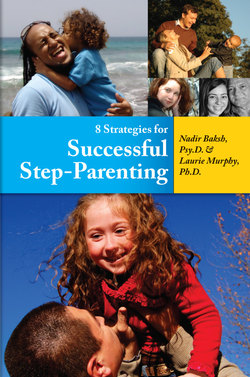Читать книгу 8 Strategies for Successful Step-Parenting - Nadir Baksh Psy.D. PsyD - Страница 13
На сайте Литреса книга снята с продажи.
Being Okay With Strengths and Weaknesses
ОглавлениеIf you cry openly at sad movies, so be it; if you laugh a little too loudly, or snort like a pig when you really let loose, then that’s okay. If you have a temper, or punish people with silence, if you have a jealous streak or secretly wish people unhappiness, fess up, at least to yourself. Then decide which of these things will prevent you from becoming an effective step-parent, keeping in mind that step-parenting isn’t just about taking care of someone else’s child. Step-parenting is about really allowing yourself to love a human being who wasn’t born from your body, but whose entire life can be impacted by you just the same.
Conversely, if you are not certain about your character attributes and flaws, you may find yourself wallowing in self-pity or seething in anger every time something doesn’t go your way; if this is the case we suggest you prepare yourself for the inevitable because there will be plenty of times that will be the case. However, if you can rise above the fray, secure in your position, comfortable in your own skin, with a strong sense of who you are and where you are going, even your staunchest dissenters will soften to your honesty. In the business of step-parenting, you are an ambassador of sorts, bridging together splintered families, soothing children who have been wounded on the divorce battlefields, blending your new family and your old family with sensitivity and humor, warmth and compassion, patience and love.
Rebecca’s Story
Rebecca was tearful throughout most of her first meeting with us; she had difficulty expressing her feelings other than to indicate that she felt excluded within her blended family. When we asked her to give examples to illuminate these feelings of exclusion, she seemed embarrassed, as if her examples would seem frivolous when they were put into words. Clearly she had difficulty communicating her feelings. At the end of her first session we invited her to go home and work with the questions in the Personal Inventory. Over the next week she begin jotting down some specific examples of situations that have caused her much emotional pain.
As we anticipated, Rebecca’s journaling in the privacy of her home allowed her to be less inhibited. The following week, when she produced her journal, it was evident that the common denominator of every situation was her insecurity about her new role as a step-parent, defined by her spouse’s mother (Helen) who happened to live on the same block. At first it appeared to Rebecca that she was accepted by Helen, especially since Helen offered her assistance even when Rebecca hadn’t asked for it; she always managed to drop by the house with the children’s favorite cookies or a casserole just as the children stepped off the school bus. But Rebecca soon noticed her feelings of insecurity intensified when she could never seem to come up with the “right” directives to her step-children. If Rebecca told them they could go out to play, Helen suggested they finish their homework first; if Rebecca offered them one of Helen’s home-made cookies, Helen reminded Rebecca that the cookies were for dessert only after the children cleaned their dinner plates. At first Rebecca was grateful for these helpful parenting hints, but over time she found that she couldn’t make any decisions without Helen stepping in with the last word.
Rebecca was grateful for her mother-in-law’s “mentoring” but she was becoming increasingly unhappy that none of her own choices seemed to be correct. By the end of Rebecca’s second session in our office it was obvious that without a clear sense of herself, her self-esteem would continue to spiral downward at the hands of her meddling, albeit helpful, mother-in-law. We crafted a treatment plan carefully and cautiously so that Rebecca’s anticipated self worth did not become a threat to her step-children’s grandmother, which would place her husband in the center of what might become a family dispute. Rebecca did her homework! Before long she began embracing her strengths and forgiving herself for past mistakes. She learned that her inexperience with children did not overshadow the valuable attributes she brought to the table. In three weeks Rebecca was ready to sit down with her mother-in-law on a more level playing field. She explained that she did not blame her mother-in-law for stepping in, but that her insecurities were based upon fear and uncertainty. She explained that she was an observant and vigilant individual who would, to the best of her ability, not allow any harm to come to the children in her charge. When Rebecca asserted herself and her new-found confidence in the meeting, her mother-in-law admitted that she had reservations about Rebecca’s commitment to the children based upon her lack of parenting experience. By clearing up prior unspoken doubts, the two women worked out a schedule whereby Rebecca would take more charge of her step-children, and her mother-in-law would support her decisions openly.
Two months after the “meeting” Rebecca came in to happily report that she and her mother-in-law found a nice balance of mutual friendship based solely upon getting to know each other. Rebecca welcomes her mother-in-law’s short, bi-weekly visits with the kids, and has found herself at the center of praise for her quickly learned parenting skills.
